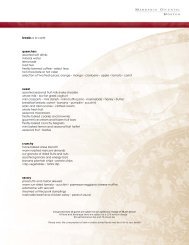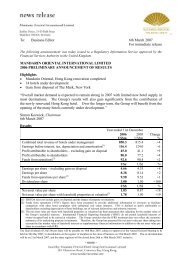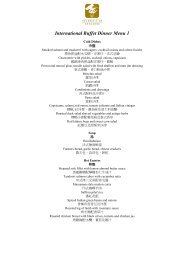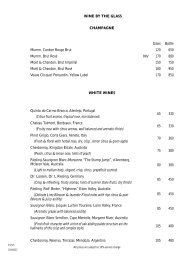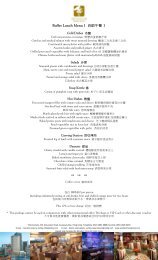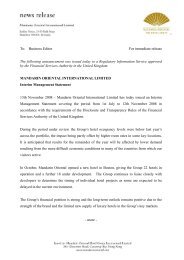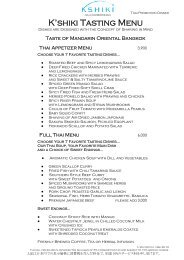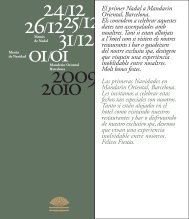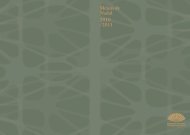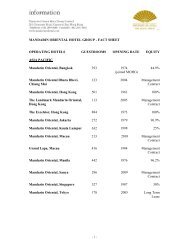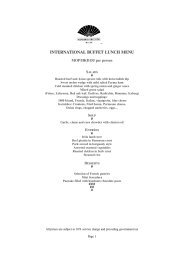Annual Report 2011 - Mandarin Oriental Hotel Group
Annual Report 2011 - Mandarin Oriental Hotel Group
Annual Report 2011 - Mandarin Oriental Hotel Group
Create successful ePaper yourself
Turn your PDF publications into a flip-book with our unique Google optimized e-Paper software.
40 <strong>Mandarin</strong> <strong>Oriental</strong> International Limited<br />
Principal Accounting Policies Continued<br />
R Derivative financial instruments<br />
The <strong>Group</strong> only enters into derivative financial instruments in order to hedge underlying exposures. Derivative<br />
financial instruments are initially recognized at fair value on the date a derivative contract is entered into and are<br />
subsequently remeasured at their fair value. The method of recognizing the resulting gain or loss is dependent on the<br />
nature of the item being hedged. The <strong>Group</strong> designates certain derivatives as a hedge of a forecasted transaction or of<br />
the foreign currency risk on a firm commitment (cash flow hedge), or a hedge of a net investment in a foreign entity.<br />
Changes in the fair value of derivatives that are designated and qualify as cash flow hedges and that are highly<br />
effective, are recognized in other comprehensive income and accumulated in equity under hedging reserves. Where<br />
the forecasted transaction or firm commitment results in the recognition of a non-financial asset or of a non-financial<br />
liability, the gains and losses previously deferred in hedging reserves are transferred from hedging reserves and included<br />
in the initial measurement of the cost of the asset or liability. Otherwise, amounts deferred in hedging reserves are<br />
transferred to profit and loss in the same periods during which the hedged firm commitment or forecasted transaction<br />
affects profit and loss. When a hedging instrument expires or is sold, or when a hedge no longer meets the criteria<br />
for hedge accounting, any cumulative gain or loss existing in hedging reserves at that time remains in the hedging<br />
reserves and is recognized when the committed or forecasted transaction ultimately is recognized in profit and loss.<br />
When a committed or forecasted transaction is no longer expected to occur, the cumulative gain or loss that was<br />
reported in hedging reserves is immediately transferred to profit and loss.<br />
Certain derivative transactions, while providing effective economic hedges under the <strong>Group</strong>’s risk management<br />
policies, do not qualify for hedge accounting under the specific rules in IAS 39. Changes in the fair value of any<br />
derivative instruments that do not qualify for hedge accounting under IAS 39 are recognized immediately in profit<br />
and loss.<br />
Hedges of net investments in foreign entities are accounted for on a similar basis to that used for cash flow hedges.<br />
Any gain or loss on the hedging instrument relating to the effective portion of the hedge is recognized in exchange<br />
reserves; the gain or loss relating to the ineffective portion is recognized immediately in profit and loss.<br />
The fair value of derivatives which are designated and qualified as effective hedges are classified as non-current assets or<br />
liabilities if the remaining maturities of the hedged assets or liabilities are greater than twelve months after the balance<br />
sheet date.<br />
S Financial guarantee contracts<br />
Financial guarantee contracts under which the <strong>Group</strong> accepts significant risk from a third party by agreeing to<br />
compensate that party on the occurrence of a specified uncertain future event are accounted for in a manner similar<br />
to insurance contracts. Provisions are recognized when it is probable that the <strong>Group</strong> has obligations under such<br />
guarantees and an outflow of resources embodying economic benefits will be required to settle the obligations.<br />
T Non-trading items<br />
Non-trading items are separately identified to provide greater understanding of the <strong>Group</strong>’s underlying business<br />
performance. Items classified as non-trading include items such as gains on disposals, provisions against asset<br />
impairment and other material items which are non-recurring in nature that require disclosure in order to provide<br />
additional insight into underlying business performance.



